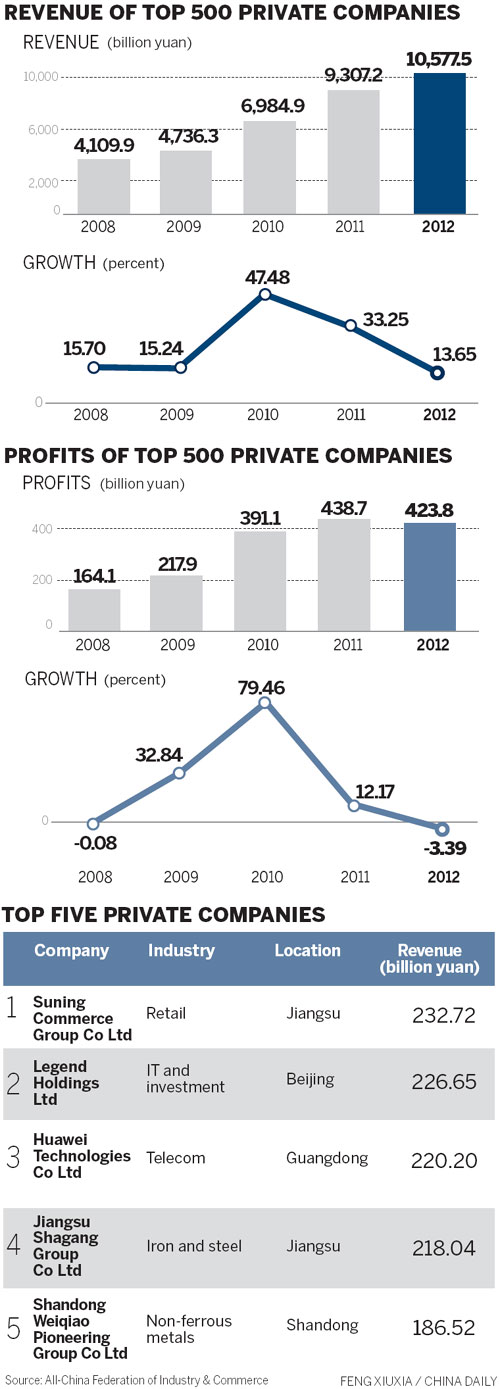Private companies fared poorly in 2012
 0 Comment(s)
0 Comment(s) Print
Print E-mail China Daily, August 30, 2013
E-mail China Daily, August 30, 2013

China's large private-sector companies turned in a weak performance in 2012, with revenue growth slowing and profits contracting, the All-China Federation of Industry & Commerce said in a report on Thursday.
Large companies are defined as those with at least 7.7 billion yuan ($1.26 billion) in annual revenue.
Aggregate sales of the top 500 private-sector companies expanded 13.65 percent last year to 10.6 trillion yuan, compared with 33.25 percent growth in 2011 and 47.48 percent in 2010, the report said. Total profits dropped 3.39 percent, the first fall in four years.
The overall decline in profitability for what's usually the economy's most resilient sector was mainly due to a crunch in some major industries where private companies are concentrated, such as steel, shipbuilding and non-ferrous metals.
In 2011, there were 65 steel companies in the top 500, and steel was the largest industry on the list. In 2012, the number fell to 55.
Not all industries struggled amid the downturn. Construction companies occupied 65 spots in the top 500 list, up from 60 a year earlier, becoming the largest industry on the list.
But despite builders' strong performance, their profitability lagged far behind companies in the Internet and related service sectors, financial services firms and software producers. Companies in the Internet and related service sectors remained the most profitable.
According to the report, Suning Commerce Group Co Ltd, an electrical appliance retailer, was the largest privately owned company in China by sales.
It was followed by Legend Holdings Ltd, a conglomerate with business in the information technology, consumer and asset management industries, and Huawei Technologies Co Ltd, a network and communication equipment-based giant.
In terms of net profit, real estate companies dominated the list, with four spots in the top 10. China Vanke Co Ltd took the top spot with a 15.6 billion yuan in net profit in 2012.
Talking about the pressure China's entrepreneurs face, Wang Qinmin, president of the federation, said tough conditions were providing impetus for change.
"The restructuring of the economy requires business transformation and upgrading of the corporate sector. There are a number of issues that entrepreneurs need to consider, including innovation in products, technology, brands and management," he said.
While the era of ultra-fast expansion is drawing to a close for private-sector companies, State-owned enterprises are gaining an ever larger hold on the economy.
Major SOEs have grown swiftly, even as the economy slowed. In 2010, 61 mainland companies, mostly SOEs, made it onto the Fortune 500 list, with total annual revenue of $2.89 trillion.
In 2012, however, 85 mainland companies made it, with total annual revenue of $4.69 trillion, up 62.5 percent. Of those 85, only eight were private companies.
When it released the 2012 list, Fortune noted that the SOEs were overwhelmingly concentrated in controlled areas such as energy, resources and banking, leaving little room for private companies.
According to the federation, 51.4 percent of private companies said that the limited progress was due to administrative barriers in regulatory agencies and 39.6 percent said the capital and technological thresholds for entering those sectors were too high.
Further, 34.6 percent said established SOEs in those sectors resisted their entry.
Wang said that Premier Li Keqiang has read the federation's survey of the private sector. Li said that he was well aware of the difficulties and the existence of "invisible thresholds" for private investors' entry into certain sectors, Wang said.
Liu Ying, an economics professor at Tsinghua University, said the slower growth of the private sector was mainly caused by the weak broader economy in China and overseas.






Go to Forum >>0 Comment(s)